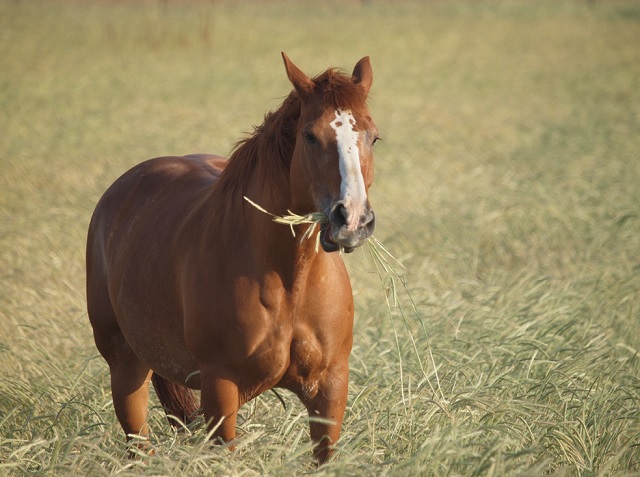
The Problem With ‘Easy Keepers’
Does your horse gain weight just looking at a blade of grass? Jody Webb shares some advice.

Flickr/lostinfog/Creative Commons
From Jody:
As the warmer weather disappears behind a cloud of rain, horse people are already experiencing the issues that come with owning the “easy keeper.” Cooler weather and fall grasses trigger the digging out of grazing muzzles and limited feed time. But caring for the easy keeper goes beyond limited fall grasses. The issue must also be addressed outside of the fresh green fields and in the barn as well.
Not much is said about the easy keeper except that exercise is a must and limiting calories is a full-time requirement. But keeping this type of horse isn’t just about cutting calories; it’s about limiting calories while still providing nutrients.
From what I have experienced in studying equine nutrition, the “easy keeper” is the most nutritionally unsound horse that there is. This surprises most people because for horses we seem to equate weight to nutritional soundness, which in the case of the chubby horse is absolutely not true. Go into a fast food restaurant and look around. You will rarely see anyone eating a burger that is underweight. With humans we think of healthy weight as being healthily fed and know that overweight people are rarely healthy people… why do we not think the same with our horses? Cutting calories usually goes hand in hand with cutting nutrition. It’s our job as horse owners to make sure we are providing the appropriate amount of calories as well as the appropriate amount of nutrition.
In the past I have cared for (and helped my customers care for) all types of horses, from chubby minis to arthritis-ridden seniors, “can’t keep weight on” thoroughbreds to those that gain weight drinking water. Of all those horses, the ones I find that are what I call “nutrition hogs” are the easy keepers.
So what is a “nutrition hog”? These are the horses that get very limited food, and consequently very limited amounts of nutrition too. What is ironic is they also seem to need a higher amount of actual nutrients than everyone else, especially where minerals are concerned. Nutritional deficiencies lead to issues such as sugar imbalances, early arthritis, increase risk of injury, hormonal imbalances, personality issues… just to name a few.
Case in point, my horse Senti. Senti is a 10-year-old Quarter Horse mare who came to me with bad feet, over the top hormones, and was considered “fat.” The reason she was considered fat was the big belly she had. However when comparing her to the Henneke Body Scoring System that rates a horse based on aspects of their appearance, she was actually underweight though not greatly so. She simply has a very large rib cage for her size and was very out of shape. No abdominal muscles, no toned abs… big belly.
Her previous owner had cut her feed down to two flakes of low quality hay per day and a small handful of a “complete” feed. Years of a low-nutrition diet led to a dull coat, nervous energy, hormonal imbalance, joint issues and bad feet. Two years of playing with her diet made me realize the importance of healthy fats in limited quantities (which helps control sugar levels) as well as her need for higher amounts of minerals than the average horse.
Senti’s current diet per day:
- 6 flakes low sugar hay
- 2 cups mixture of flax, camelina and coconut meal
- 4 tablespoons mixture of kelp, DE, and bentonite clay
- 4-6 tablespoons various herbs of her choice (via herbal sampling)
- 2 tablespoons each of salt, MSM and nutritional yeast
Senti had the start of a cresty neck when I got her, which is now gone. She is no longer protective of her food as she is now getting a good quantity of hay in a slow feed hay bag and feels satisfied. Her feet are strong, grow well, and do not chip. Her coat is shiny with a smooth mane and tail. As her hormones balanced she went from being jumpy and spooky to being calm and loving.
The moral of this story? SIZE DOES NOT EQUAL HEALTH! So when taking your easy keeper’s diet into consideration, realize that cutting calories can also mean cutting vital nutrition. Cut the grains, cut the fancy hays, but find ways to provide the appropriate nutrients.
Your horse will thank you for it.
Follow this link for my suggested diet outline.
Jody Webb is the “Solepreneur” of AverageJo Equine, with a line of all natural supplements for horses and dogs. Her Wild Horse and Wild Dog line of products is the focus of years of research with the goal of taking your pets away from chemical laden feeds and supplements and taking them back to as close to nature as is possible in a tamed environment. With her three horses, two dogs, two cats, various rescue horses and their individual issues, there are plenty of willing volunteers with which to perfect each product. This desire came upon finding her then new horse Gideon was suffering from a metabolic disorder called EPSM. Though this disorder can never be cured and there will always be lifelong health issues for Gideon, he has gone from a cranky, underweight and severely in pain train wreck to a sassy and healthy looking beast! Jody is now taking her knowledge learned from owning such a difficult animal to moving on and helping other horse and dog owners have healthier, happier pets. Her writing comes out of the joys and pains of owning such a challenging animal. Learn more about all-natural horse products at Jody Webb’s blog, WildHorseProducts.com.








Leave a Comment